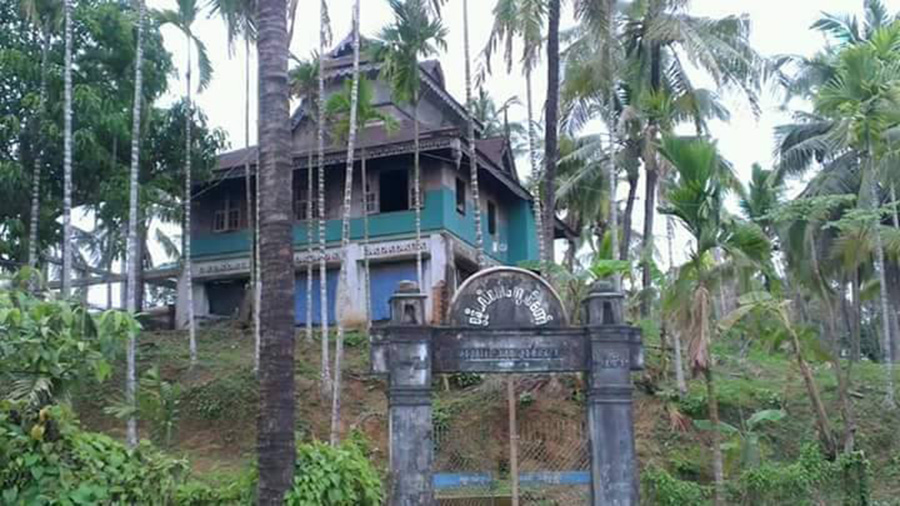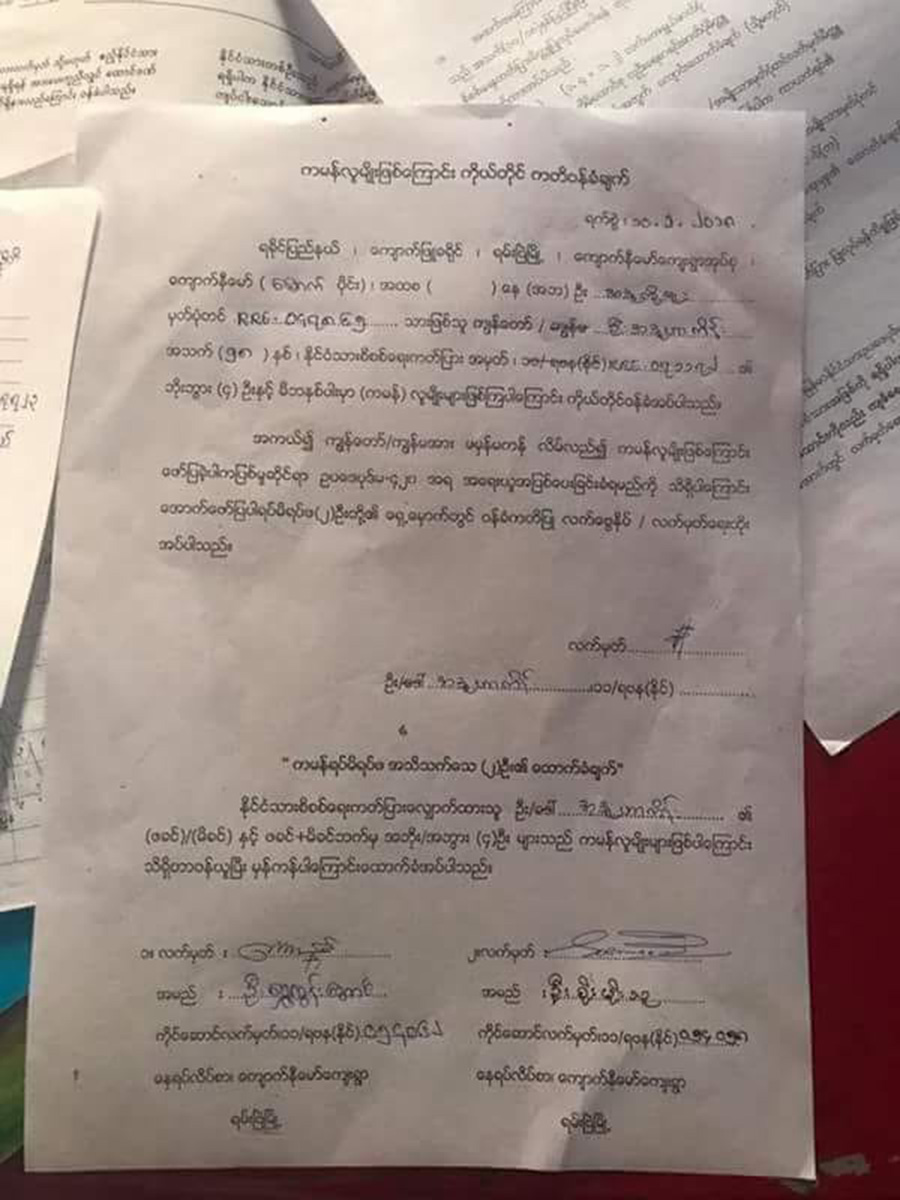YANGON — The Kaman National Progressive Party (KNPP) has lodged complaints with the Myanmar President’s Office and State Counselor Daw Aung San Suu Kyi alleging that more than 3,000 National Registration Cards (NRCs) with ethnic Kaman status were inappropriately issued to Rohingya in southern Rakhine State’s Ramree Township.
The party has requested a review of the Immigration Department’s issuance of the NRCs, which are also known as “pink cards”.
According to the KNPP, the department wrongly handed 3,306 Kaman IDs to non-Kaman Muslims from Ramree Township’s Kyauk Ni Maw between December 2017 and August 2018. The Arakan League for Democracy (ALD) sent a letter making the same objection to the township’s office of the General Administration Department (GAD), which is a branch of the Ministry of Home Affairs. It urged the authorities to revoke the IDs.
The Immigration Department denies that any NRCs have been wrongly supplied to Rohingya.
Who Are the Kaman?
The Kaman are classified as one of Burma’s 135 officially recognized ethnic groups and one of seven ethnic subgroups of Rakhine State. Unlike the Buddhist Arakanese, the Kaman are Muslim. They have been residing in Rakhine for centuries.
During the Arakan Kingdom, the Kaman served as royal archers, but this profession vanished when the kingdom fell to the Burmese Konbaung Dynasty in 1784. Nowadays, there are about 45,000 ethnic Kaman Muslims across the country. They mostly live in Thandwe, Kyaukphyu, Ramree, Sittwe and Myaybon townships in Rakhine, as well as in Yangon and Mandalay.
Though they practice a different religion, the Kaman community is well integrated into Myanmar life; they speak the Arakanese language and share their traditional attire, used to wear ordinary Burmese garb in their daily lives, and enjoy taking part in Myanmar’s annual water festival.

Tragic Recent History
However, the good relations between the Arakan and Kaman peoples that have characterized the diverse Rakhine community were soured by sectarian violence in 2012. In May of that year, a young Arakanese woman, Thida Htwe, was raped and had her throat slit by three Rohingya men in Ramree Township’s Kyauk Ni Maw village tract.
The following month, nine Muslims were killed in Taungup Township by an Arakanese mob seeking to avenge the death of Thida Htwe. Clashes broke out between the Rakhine and Rohingya communities across the state, leaving hundreds dead and more than 100,000 Rohingya in camps for internally displaced persons (IDPs).
Following the 2012 clashes, Kaman from Kyaukphyu, Ramree, Thandwe and Sittwe townships were targeted by the Rakhine population, who accused the Kaman of helping Rohingya Muslims obtain pink cards, which confer full Myanmar citizenship on the card holder. (Rohingya are not citizens of Myanmar.) Both the KNPP and community leaders have previously told The Irrawaddy that they believe the cards were improperly issued due to “malpractice by government officials”.
Coincidentally, the latest controversy involving the improper issuance of another 3,306 IDs to Rohingya by the Immigration Department also occurred in Ramree’s Kyauk Ni Maw village tract.
KNPP secretary U Tin Hlaing Win said, “I was really shocked at their [immigration officials’] manner regarding this issue. They [the Rohingya holders of the improperly issued cards] have nothing to do with our community; we do not even have any mixed-race [Rohingya-Kaman] here.”
Why Did the Kaman Object to the Immigration Dept?
Some Arakanese have commented that Ramree’s current Kaman population totals fewer than 500 people. Kaman Social Network (KSN) founder U Tun Ngwe puts the township’s total Kaman population, both rural and urban, at a mere 600.
Kyauk Ni Maw is home to about 300 Kaman out of a total population of 7,000, including Rakhine and Rohingya. U Tun Ngwe said his organization strongly objected to the Immigration Department’s move, and had already notified government ministries and relevant organizations.
The Irrawaddy was shown an official household registration document dated 2013 issued by the GAD which shows the Kyauk Ni Maw population at that time as being 4,300 with the Kaman numbering a mere 500.
He said, “I want to point out that the Immigration Department deliberately issued [mixed] Kaman-Bengali descent cards to some mixed-blood Kaman families in Ramree in the past. But this time, they gave ethnic Kaman IDs to all Kyauk Ni Maw [Rohingya] people, which is a very questionable matter for us.”
U Tun Ngwe explained that both the Rakhine and Kaman communities in the area are strongly opposed to the project and have demanded that officials re-check the details. If the government fails to solve the problem, it could lead to conflict, he warned.
KNPP secretary U Tin Hlaing Win said immigration officers have been issuing the documents in secret, without informing either the Rakhine or the Kaman communities, since 2017.
“We are not blocking the citizenship rights of other groups. We Kaman are talking about issuing IDs under ethnic status. It’s about ethnic rights, not citizenship rights.”
Political Influence
Than Maung Oo, an Arakanese lawmaker from Ramree Township posted that it is easy for a “Bengali” (as Rohingya are known to most people in Myanmar) to receive an official pink card if the applicant has a recommendation from two Kaman ID holders. He called on the government to take responsibility for wrongdoing in the matter.
The 3,306 IDs have become the focus of a public debate — and prompted hate speech — on social media. Some commenters say that as long as a person meets the conditions laid down in the 1982 law on the subject, there is no problem with the Immigration Department issuing them a citizenship card.
However, many strongly opposed the practice of “creating fake Kaman” and some blamed the Kaman community, describing them as a “doorway for Ben-Kaman”.
Some raised the specter of growing numbers of “fake Kaman” exerting a political influence within the wider Kaman community, pointing out that once any group’s population reaches 0.1 percent of the national population of 51 million, they are eligible to contest regional elections and potentially be represented by an ethnic affairs minister.
Ramree resident Htin Lin Khine echoed this sentiment, saying, “Yes, we are deeply concerned about Kaman identity being used as a tool to be exploited by other groups for their own political benefit.”
However, he added that the Kaman and Arakanese communities have a strong relationship at the moment and have exchanged views on the issue.
“Everyone in town knows all about these [pink card] irregularities. My Kaman friends [in Ramree] know every single Kaman person here by name,” he said.
Both the Arakanese and Kaman sides are now investigating to find the root causes and the people responsible for the problem. A few people have been identified by locals and preparations are being made to take action against them through parliamentary channels.
Response from Naypyitaw
Immigration officials in Naypyitaw denied the assertions by the Kaman and Rakhine political parties that the department has erroneously delivered more than 3,000 NRCs with ethnic Kaman status to Rohingya Muslims in Ramree Township.
Department of National Registration and Citizenship Deputy Director General U Shein Win told The Irrawaddy over the phone on Monday evening that Kaman community leaders from Kyauk Ni Maw village in Ramree Township asked the Immigration Department for ID cards at the end of 2017.
He claimed that the pilot project was led by a district administrative officer based in Kyaukphyu, assisted by government officials from Ramree Township, along with Kaman community leaders from Kyauk Ni Maw village. He did not provide the names of the village trustees and community leaders.
The verification process started in January 2018 and examined the family backgrounds of each applicant, U Shein Win said, adding that the department had provided 3,306 IDs under the initiative so far. He said every single applicant requires a recommendation from the Kaman community leaders and must produce their parents’ IDs.
“The applicant signs a notice swearing that he or she is really an ethnic Kaman and that they are aware of the legal punishments if his or her claims are found to be false.”

When U Shein Win was asked by The Irrawaddy whether officials would review the newly issued IDs, he simply replied that they have already examined the applicants and issued the IDs in line with the 1982 Citizenship Law. There is no plan for a review, he said.
“We will take action against responsible officers on a case-by-case basis if the [KNPP] provides concrete evidence [of wrongdoing] to us,” he said.
Party secretary Tin Hlaing Win pointed out that issuing a false NRC card could be regarded as a violation of the 1982 Citizenship Law’s Sections 18 and 19. The Kaman and Rakhine parties as well as residents of Ramree Township claim that the 3,306 IDs were granted to “pure Rohingya”, and that those on the list were not even of mixed Rohingya-Kaman descent.
Union Minister for Labor, Immigration and Population U Thein Swe was appointed by State Counselor Daw Aung San Suu Kyi when the National League for Democracy took office in April 2016. The Irrawaddy asked Immigration official U Shein Win whether the pilot projects in Rakhine were launched at the instruction of the state counselor. He replied simply that his ministry is doing its work in line the laws.
U Thein Swe, a member of the former military junta, served as minister for transport under ex-dictator Senior General U Than Shwe and is also a member of the NLD’s rival, the Union Solidarity and Development Party (USDP).
The immigration official repeatedly insisted that his ministry had acted in line with the law and documented every case handled by the township immigration department. However, he acknowledged that officials had failed to consult with the Kaman political party and civil society groups over the verification process.

















